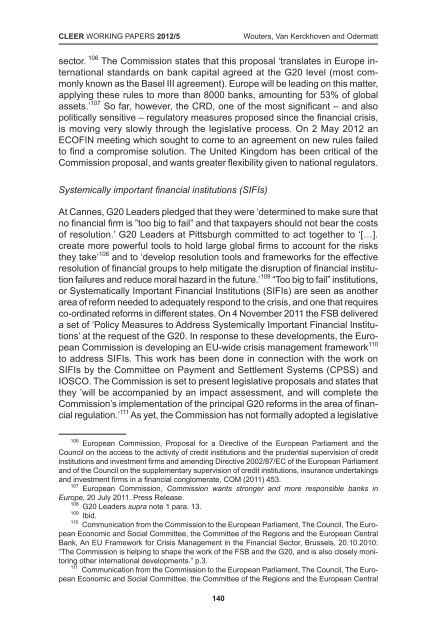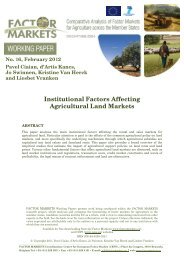Principles and practices of EU external representation - Asser Institute
Principles and practices of EU external representation - Asser Institute
Principles and practices of EU external representation - Asser Institute
Create successful ePaper yourself
Turn your PDF publications into a flip-book with our unique Google optimized e-Paper software.
CLEER WORKING PAPERS 2012/5Wouters, Van Kerckhoven <strong>and</strong> Odermattsector. 106 The Commission states that this proposal ‘translates in Europe internationalst<strong>and</strong>ards on bank capital agreed at the G20 level (most commonlyknown as the Basel III agreement). Europe will be leading on this matter,applying these rules to more than 8000 banks, amounting for 53% <strong>of</strong> globalassets.’ 107 So far, however, the CRD, one <strong>of</strong> the most significant – <strong>and</strong> alsopolitically sensitive – regulatory measures proposed since the financial crisis,is moving very slowly through the legislative process. On 2 May 2012 anECOFIN meeting which sought to come to an agreement on new rules failedto find a compromise solution. The United Kingdom has been critical <strong>of</strong> theCommission proposal, <strong>and</strong> wants greater flexibility given to national regulators.Systemically important financial institutions (SIFIs)At Cannes, G20 Leaders pledged that they were ‘determined to make sure thatno financial firm is ”too big to fail” <strong>and</strong> that taxpayers should not bear the costs<strong>of</strong> resolution.’ G20 Leaders at Pittsburgh committed to act together to ‘[…].create more powerful tools to hold large global firms to account for the risksthey take’ 108 <strong>and</strong> to ‘develop resolution tools <strong>and</strong> frameworks for the effectiveresolution <strong>of</strong> financial groups to help mitigate the disruption <strong>of</strong> financial institutionfailures <strong>and</strong> reduce moral hazard in the future.’ 109 “Too big to fail” institutions,or Systematically Important Financial Institutions (SIFIs) are seen as anotherarea <strong>of</strong> reform needed to adequately respond to the crisis, <strong>and</strong> one that requiresco-ordinated reforms in different states. On 4 November 2011 the FSB delivereda set <strong>of</strong> ‘Policy Measures to Address Systemically Important Financial Institutions’at the request <strong>of</strong> the G20. In response to these developments, the EuropeanCommission is developing an <strong>EU</strong>-wide crisis management framework 110to address SIFIs. This work has been done in connection with the work onSIFIs by the Committee on Payment <strong>and</strong> Settlement Systems (CPSS) <strong>and</strong>IOSCO. The Commission is set to present legislative proposals <strong>and</strong> states thatthey ’will be accompanied by an impact assessment, <strong>and</strong> will complete theCommission’s implementation <strong>of</strong> the principal G20 reforms in the area <strong>of</strong> financialregulation.’ 111 As yet, the Commission has not formally adopted a legislative106 European Commission, Proposal for a Directive <strong>of</strong> the European Parliament <strong>and</strong> theCouncil on the access to the activity <strong>of</strong> credit institutions <strong>and</strong> the prudential supervision <strong>of</strong> creditinstitutions <strong>and</strong> investment firms <strong>and</strong> amending Directive 2002/87/EC <strong>of</strong> the European Parliament<strong>and</strong> <strong>of</strong> the Council on the supplementary supervision <strong>of</strong> credit institutions, insurance undertakings<strong>and</strong> investment firms in a financial conglomerate, COM (2011) 453.107 European Commission, Commission wants stronger <strong>and</strong> more responsible banks inEurope, 20 July 2011. Press Release.108 G20 Leaders supra note 1 para. 13.109 Ibid.110 Communication from the Commission to the European Parliament, The Council, The EuropeanEconomic <strong>and</strong> Social Committee, the Committee <strong>of</strong> the Regions <strong>and</strong> the European CentralBank, An <strong>EU</strong> Framework for Crisis Management in the Financial Sector, Brussels, 20.10.2010:“The Commission is helping to shape the work <strong>of</strong> the FSB <strong>and</strong> the G20, <strong>and</strong> is also closely monitoringother international developments.” p.3.111 Communication from the Commission to the European Parliament, The Council, The EuropeanEconomic <strong>and</strong> Social Committee, the Committee <strong>of</strong> the Regions <strong>and</strong> the European Central140








